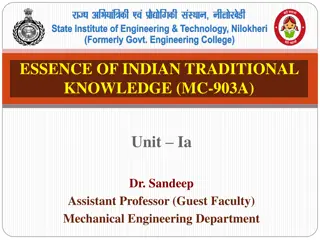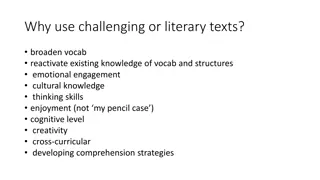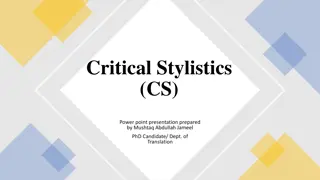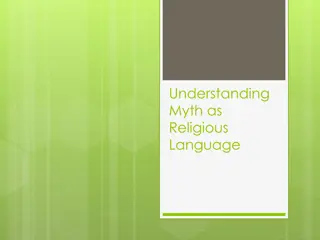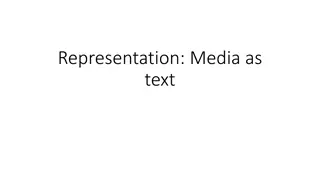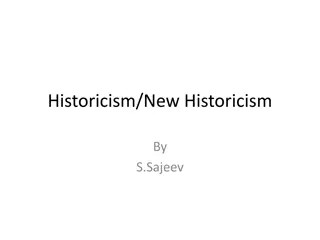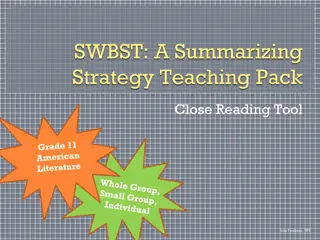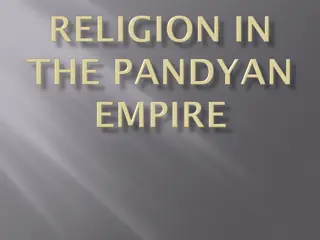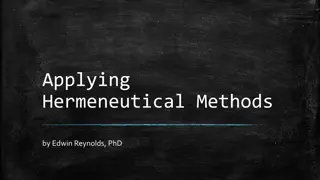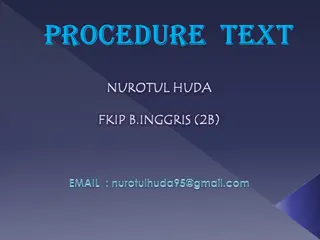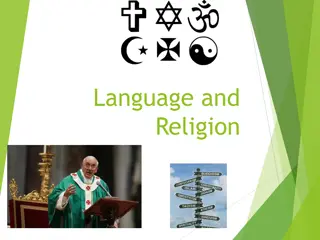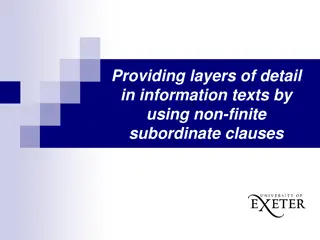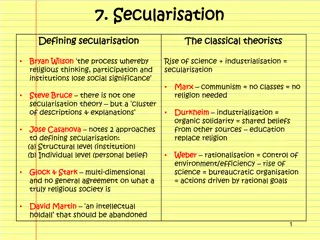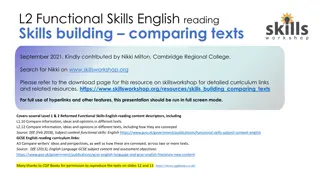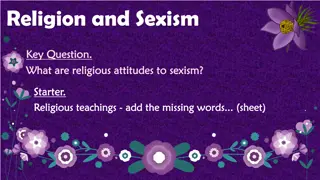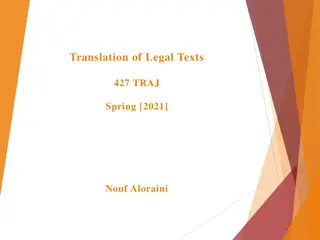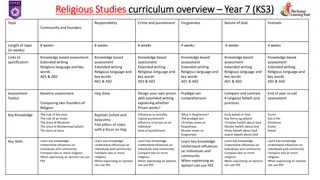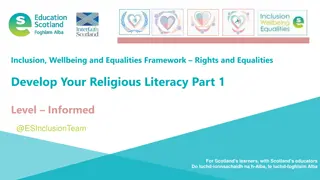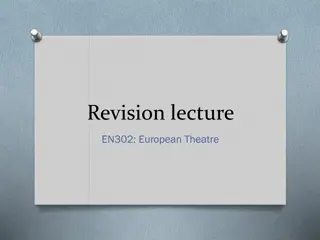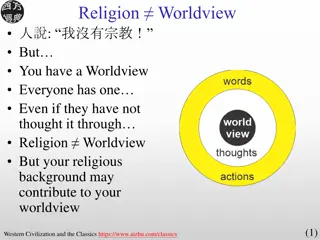Status of Family Laws in India: Hindu vs. Religious Minorities
The family and personal status laws in India vary between Hindu law and those pertaining to religious minorities. While Hindu law has seen extensive reforms, discriminatory provisions still exist. In contrast, laws governing religious minorities have undergone fewer reforms, leading to greater inequ
2 views • 4 slides
The Essence of Indian Traditional Knowledge: Vedic Culture and History
The Vedas, ancient religious texts of Hinduism, provide essential knowledge about existence and the divine. Believed to have always existed, they were orally transmitted before being written down between 1500-500 BCE in India. The Vedas are considered among the oldest religious works and are categor
1 views • 41 slides
Enhancing Language Skills Through Challenging Literary Texts
Broaden vocabulary, reactivate knowledge, and engage emotionally with challenging literary texts to develop comprehension strategies, cultural awareness, and cognitive skills. Utilize various media sources and explicit instruction to access more complex texts, fostering creativity and cross-curricul
4 views • 28 slides
Understanding Critical Stylistics: Tools and Application
Critical Stylistics (CS) is a method that delves into the ideological underpinnings of texts through the analysis of linguistic features. Developed by Jeffries, CS focuses on uncovering implicit ideologies embedded in texts by examining stylistic choices. By integrating stylistics and critical disco
2 views • 28 slides
Understanding Religious Conflict: Definition and Types Explored
Religious conflict is a complex and recurring concept throughout history. Scholars have defined it as disagreements between religious groups. This conflict arises from contentious issues touching on ideology, morality, power, and identity, influenced by various socio-political, economic, and cultura
1 views • 13 slides
Understanding Myth as Religious Language: Exploring Concepts and Interpretations
Explore the multifaceted nature of myths as religious language, delving into their equivocal definitions, truth claims about God, and use of rhetorical devices. Discover the significance of myths in providing human understanding of God, revealing divine attributes, and addressing fundamental questio
0 views • 17 slides
Evolution of Akbar's Religious Policy: A Historical Overview
In the 16th century, Akbar the Great implemented a revolutionary religious policy in the Mughal Empire. Initially a devout Sunni Muslim, Akbar evolved his stance to promote harmony and equality among all religions, fostering tolerance and understanding. This shift marked a significant departure from
1 views • 25 slides
Exploring Texts, Culture, and Value Through Appropriation
In Year 11 Extension 1, students delve into texts from the past and their influence on present culture. They analyze the relationships between texts and culture, language's impact on values, and different responses to texts. Through close study, they explore key texts from the past, examining how th
0 views • 9 slides
Elizabethan Religious Settlement: Unity Amidst Division
Amid religious division in England, Queen Elizabeth I implemented a Religious Settlement in 1559 to unify the country. The settlement, a blend of Protestant and Catholic elements, aimed to maintain peace and prevent rebellions. Elizabeth's strategic compromise pleased most people, though lingering t
0 views • 14 slides
Understanding Representation in Media Studies
Representation in media studies refers to how aspects of society such as gender, age, ethnicity, and identity are presented to audiences through media texts. These texts have the power to influence ideas and attitudes by shaping the audience's understanding of important topics. Analyzing media texts
1 views • 19 slides
Understanding Secularism: Principles and Advantages
Secularism is the principle of separating government institutions from religious entities to ensure equal rights for believers and non-believers. It safeguards freedom of religious belief and practice, upholds religious freedom, and promotes democracy and fairness. Secularism aims to prevent religio
0 views • 21 slides
Exploring Historicism and New Historicism: Perspectives on History and Literature
Understanding Historicism and New Historicism, this article delves into their definitions, perspectives on history, treatment of literary and non-literary texts, examples, and the emergence of New Historicism in the 1980s. It explores how these approaches unify cultural and social texts, challenge t
0 views • 16 slides
Understanding Religious Language: Cognitivism vs. Non-Cognitivism in the University Debate
This discussion explores the debate between cognitivism and non-cognitivism in religious language. Cognitivism asserts that religious claims aim to describe the world and can be true or false, while non-cognitivism argues that such claims express attitudes and cannot be verified. Flew's challenge qu
0 views • 9 slides
SWBST Summarizing Strategy Teaching Pack Overview
SWBST is a summarizing strategy designed by Julie Faulkner to help readers comprehend texts effectively. It entails breaking down texts into key components: Somebody (main character/speaker/author) Wanted (motivation), But (problem/conflict), So (solution), Then (resolution). The strategy aids in hi
0 views • 18 slides
Hinduism Flourishing in the Pandyan Empire
Hinduism flourished during the period of the Pandyan Empire, with rulers giving extensive donations to Saiva and Vaishnava temples. They provided endowments for temple renovation and maintenance. Notable rulers like Maravarman Sundara Pandyan and Jatavarman Sundara Pandiya contributed significantly
0 views • 18 slides
Comparative Hermeneutics: Understanding Biblical Texts
Explore the application of hermeneutical methods on biblical texts such as Psalm 23 and 1 Tim. 2 through interpretation, translation, and contextual analysis. Delve into the meaning of texts, the role of signs and symbols, and the impact of varying presuppositions on interpretation. Reflect on the p
0 views • 46 slides
GCSE English Literature Exam Overview
This overview provides information on the GCSE English Literature exam structure, content, and assessment objectives for both components. It includes details on the texts studied, such as Shakespeare, poetry, post-1914 prose/drama, and 19th-century prose. Students are assessed on their ability to re
0 views • 23 slides
Guide to Using the BSA Calendar of Religious Observances
The BSA Calendar of Religious Observances is a valuable resource for scheduling scouting events in consideration of various religious holidays and observances. This guide provides an overview of the calendar, highlights important dates, and emphasizes the importance of respecting religious diversity
0 views • 8 slides
Understanding Procedure Texts and their Structure
Procedure texts are instructional pieces of writing that explain how something works or how to perform a specific activity. They typically consist of three main definitions: texts that explain how to use something, texts that provide instructions for a particular activity, and texts that address hum
0 views • 10 slides
Understanding the Role of Language in Religion
Exploring the significance of language in religious contexts, this content discusses the functions, features, lexicon, grammar, and metaphorical aspects present in religious language. It delves into how religious language upholds spiritual beliefs, persuades believers, and expresses specific attitud
0 views • 8 slides
Understanding the Cultural Dimensions of Food and Religious Influences in Culinary Arts
Explore the impact of religious beliefs on food traditions and dietary restrictions across different cultures in the culinary world. Learn about the influence of major world religions on eating habits, food choices, and culinary practices. Discover how various religious groups, such as Christians, o
0 views • 26 slides
The Vital Role of Religious Institutions in Supporting Immigrants
Religions and immigration are interlinked in modern societies, where religions play a significant role in providing services, defending rights, and supporting the social cohesion of immigrants. Mainstream religious institutions serve as key actors in offering assistance, advocating for migrant right
2 views • 14 slides
Understanding Religious Language: Flew, Hare, Mitchell
Exploring the contrasting views of cognitivism and non-cognitivism in the context of religious language through the perspectives of Flew, Hare, and Mitchell. Delve into Flew's challenge on the undetectable gardener, Hare's concept of bliks, and Mitchell's response to the rationality of religious bel
0 views • 7 slides
Religious Accommodation in the Army: Advising Command
The content discusses the role of the Chaplain Corps in advising Soldiers and leaders on religious accommodation in the Army as of February 13, 2019. It covers learning objectives, legal foundations, Army policies, procedures, recent changes, and references related to religious accommodation. The in
0 views • 36 slides
Enhancing Information Texts with Non-Finite Subordinate Clauses
Providing layers of detail in information texts involves using non-finite subordinate clauses to establish connections between grammar, meaning, and rhetorical effects. The LEAD principles emphasize linking grammar to writing purposefully, using authentic texts as models, and fostering deep metaling
0 views • 8 slides
Understanding Religious Discrimination Laws in California Workplace
Learn about the regulations and protections under FEHA and Title VII in California, including religious exemptions, accommodation requirements, case studies, and best practices to address discrimination issues effectively. Discover the statistical insights on religious discrimination complaints and
0 views • 45 slides
Understanding Secularisation: The Decline of Religious Influence in Society
Secularisation refers to the process in which religious thinking, participation, and institutions lose their social significance. This phenomenon is influenced by factors such as the rise of science, industrialisation, changing social attitudes, and the disengagement of the church from society. Evid
0 views • 8 slides
Philosophers' Views on Religious Experience: Insights and Critiques
This lesson delves into the perspectives of various philosophers such as Rudolph Otto, Richard Swinburne, John Hick, and Michael Persinger on religious experiences. It explores concepts like the numinous, religious knowledge, God's existence, and criticisms on the validity of religious experiences.
0 views • 7 slides
Philosophers' Views on Religious Experience: Insights from William James
Explore William James' perspective on religious experiences, including his views on existential and value judgments. Understand how James argued for the validity of religious experiences and their potential proof of God's existence. Delve into the implications of emotions and prior beliefs on interp
0 views • 7 slides
Religious and Social Conflicts Fueling the Rise of Absolutism in Europe
Social, economic, and religious conflicts in Europe played a significant role in the emergence of absolutism where monarchs wielded supreme power without sharing it with legislative bodies. Events like Spain's religious conflicts, Protestantism in England, the Spanish Armada, religious conflict in t
0 views • 10 slides
Religious Pluralism and Civil Society: A Paradox in Government Control
Understanding the intricacies of religious pluralism in the context of government control reveals a paradox where restricting religion can hinder social cohesion and economic growth. Through insights on the counterproductivity of control, the role of religious organizations in civil society, and the
0 views • 16 slides
Enhancing Reading Skills: Comparing Texts for English Learners
Enhance your English reading skills by comparing texts to identify similarities and differences. Practice analyzing information, ideas, and opinions in different texts, including how they are conveyed. This resource provides exercises and examples to help you develop your ability to compare and cont
0 views • 14 slides
Religious Attitudes Towards Sexism
Explore religious teachings and beliefs regarding sexism, comparing views on the roles of women in society, historical examples of sexist attitudes, and interpretations of scripture. Evaluate differing opinions within religion and consider positive and negative depictions of women in religious texts
0 views • 7 slides
US Religious Freedom Restoration Act (RFRA) Overview
The US Religious Freedom Restoration Act (RFRA) aims to protect the free exercise of religion by ensuring that governments do not substantially burden religious practices without compelling justification. It emphasizes striking a balance between religious liberty and governmental interests through t
0 views • 9 slides
Translation of Legal Texts Course Overview
This course provides a comprehensive overview of translating legal texts from English into Arabic and vice versa. Students will explore various types of legal texts, specialized terminology, and resources essential for accurate translation. The course covers the history of legal discourse, emphasizi
0 views • 50 slides
Religious Studies Curriculum Overview for Year 7 and 8 (KS3)
Explore various topics such as responsibility, crime and punishment, forgiveness, nature of God, festivals, community, founders, worship, creation, life after death, rules and laws, relationships in this detailed Year 7 and 8 (KS3) Religious Studies curriculum. The curriculum includes assessments, e
0 views • 6 slides
Developing Religious Literacy for Educators in Scotland
This resource aims to enhance educators' understanding of religious literacy by exploring religious discrimination, core beliefs of major faiths, and additional learning sources. It encourages educators to consider the needs of learners in relation to their religious beliefs in Scotland.
0 views • 30 slides
Settling the Northern Colonies: Religious Transformation and Colonization
The Protestant Reformation led to the emergence of Puritanism in the Northern Colonies, with figures like Martin Luther and John Calvin shaping religious beliefs. The Massachusetts Bay Colony stood as a beacon of self-government and religious ideals, while dissenters like Anne Hutchinson and Roger W
0 views • 9 slides
Exam Rubric and Guidelines for European Theatre Module
The content discusses important information regarding the exam rubric for the European Theatre module, including guidelines on time limits, permitted topics, penalties for violations, and advice on handling exam questions. It clarifies rules on writing about the same texts as in coursework essays, s
0 views • 29 slides
Moses: A Historical Figure and Author of Foundational Texts
Moses, a key figure in Western civilization, is revered for his leadership in freeing the Israelites from slavery in Egypt and his authorship of foundational religious texts like the Torah. His life is divided into four stages, from infancy as a slave baby to his role as a shepherd and ultimately as
0 views • 8 slides

